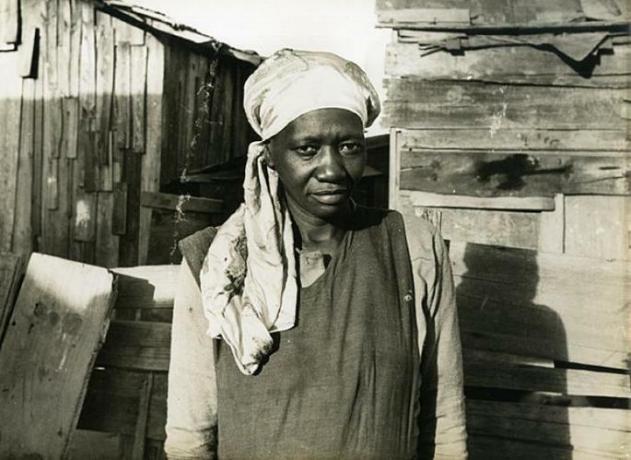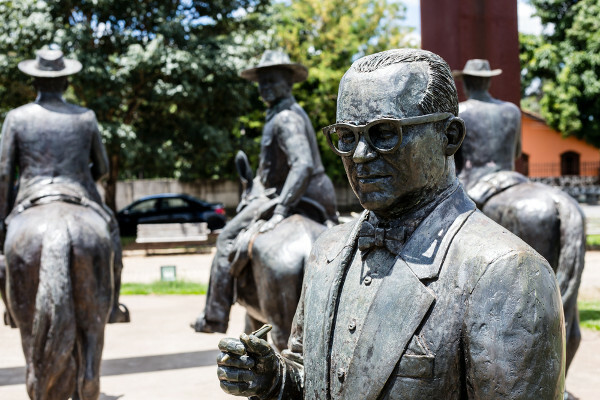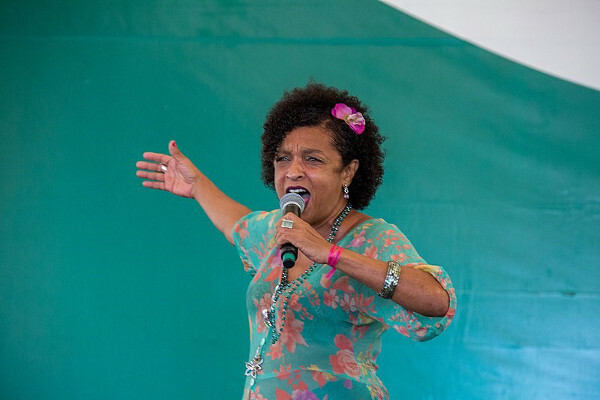Carolina Maria de Jesus (1914-1977) was a black Brazilian writer, author of Eviction Room: Diary of a Favela, work published in 1960.
Carolina de Jesus was a garbage collector and had little education, but she was passionate about letters and read frequently. Living in a favela in São Paulo, she wrote diaries that told of her daily life, until she was discovered by a journalist who supported her in the publication of her manuscripts.
These manuscripts became Eviction Room: Diary of a Favela, a best seller translated into several languages, because even with its limitations - in the absence of punctuation and graphical errors in some words - the work stood out for what it conveyed about living in a slum.
After the success of Dump Room, the writer was not successful with the other books she wrote, and died almost forgotten.
In recent years, Carolina's life and work have been the object of study, which once again gave visibility to the writer. As a result, the library of the Afro-Brasil Museum, located in Ibirapuera Park - inaugurated in 2000 - was named Carolina Maria de Jesus.
Storage Room
Eviction Room: Diary of a Favela it is, without a doubt, the great success of Carolina Maria de Jesus. Translated into thirteen languages, the work recounts the daily life of Carolina, who lives in a favela in São Paulo in the 1950s.
The book emerged from the edition of twenty notebooks that Carolina wrote every day. In these notebooks, the author tells daily difficulties to guarantee food, racial prejudice, problems with neighbors and also with the education of her three children.
Several passages in the book, written in simple language, account for this reality, whose work plays an important role as social criticism.
storage room it contemplates Carolina's experiences between July 15, 1955 and January 1, 1960. But there are leaps in the work, that is, the book does not contain each of the dates over these years. Such leaps are the result of the review made by journalist Audálio Dantas for its publication, which removed the parts of subjects that were repetitive, such as hunger.
Hunger was a problem faced daily, which bothered Carolina a lot and, therefore, she wrote. In the words of the author, who even confirmed in the work that she knew that the color of hunger was yellow, Carolina says that
When I had nothing to eat, instead of cursing I wrote.
So, in order not to make the book so repetitive, Audalio cut some parts of the text, such as those that speak of hunger.
Among so many difficulties, living with neighbors was not very pleasant. She was criticized for being a single mother, but felt lucky not to have a husband, as she witnessed many violent fights between husband and wife. Carolina didn't like the fact that her children lived in that environment.
Storage Room has the following characters:
- Carolina Maria de Jesus, the author herself, who is the protagonist;
- João José, Carolina's oldest teenage son, whom his mother calls “starving”;
- José Carlos, Carolina's middle son;
- Vera Eunice, Carolina's youngest daughter;
- Carolina's neighbors, who lived in the Canindé favela.
The title of the book expresses what Carolina felt when the collective housing where she lived were demolished to build buildings. Evicted to live under the bridge, Storage Room means that the favela is the eviction room of a city, in the words of the author:
In 1948, when they started to demolish the one-story houses to build the buildings, we, the poor who lived in the collective housing, were evicted and stayed under the bridges. That's why I call the favela the eviction room of a city. We, the poor, are the old trash.
Storage Room it has concordance errors, words with lack of accents, but also many fancy words, which the author learned through the reading routine she had.
Even with its limitations, the work is a highlight for what it conveys about living in a favela. No one out of that condition would have achieved a better result.
Carolina de Jesus Biography
Carolina Maria de Jesus was born on March 14, 1914, in Sacramento, municipality of Minas Gerais. In childhood, she was known as Bitita.
Very humble, her mother worked as a laundress, and with the help of her employer, Carolina attended Colégio Allan Kardec until the second year of primary school.
She moved to São Paulo, where she went to live in the Canindé favela, located on the banks of the Tietê River.
She was employed in a doctor's house and, in love with books, she used the boss's private library. Later, she worked as a washerwoman and a collector of paper and other types of garbage.
As a waste picker, in addition to taking advantage of everything she could for her and her children's survival, she collected books and notebooks from the trash.
Thus, Carolina had access to the books, which will later leave their mark on the elaborate vocabulary she used in her manuscripts.

Carolina had three children with different parents-João José de Jesus, José Carlos de Jesus and Vera Eunice de Jesus Lima-and she raised them alone. The first was the son of a Portuguese sailor; the second, the son of a Spaniard, and the girl, the daughter of a merchant.
Even with a very heavy routine, Carolina often read and wrote what she lived in her daily life in the favela, recording everything in the form of a diary, in the notebooks she found in the trash.
These records earned him twenty notebooks, some of which would later be published in a book, Eviction Room: Diary of a Favela, which would become a big hit.
It all happened when, as a result of a report in the Canindé favela, journalist Audálio Dantas met Carolina, who showed him her notebooks. Impressed by the material she had on hand, she organized and revised the manuscripts, helping to publish it in 1960.
At the time, there were those who speculated the authorship of the manuscripts. The journalist explained that her job would have been to correct the punctuation, correct the spelling of some words and omit many repetitions in the text, such as that of many records mentioning the famine they were going through, a situation that was quite frequent.
The book caught the attention of the literary world and its first edition alone brought in the sale of 30,000 copies.
Carolina became famous and made some money, but she didn't get rich. Her acquaintances in the favela thought she had become rich and asked her for money, not returning it later.
Before that, she had already asked a publisher in the United States to publish her writings in exchange for basic living conditions, a house to live with her children and food. However, the submitted manuscripts were returned.
After this success, other books were published, but without the same success. And seventeen years after the publication of her first book, on February 13, 1977, Carolina died almost forgotten in a farm on the outskirts of São Paulo, where she lived. He was 63 years old.
In the same year as Carolina's death, her eldest son - who was very ill - also died. In 2016, the middle child was run over.
Vera Eunice, Carolina's youngest daughter, became a teacher, which was her mother's dream for Vera. Before dying, Carolina delivered a letter to her daughter asking her to disclose her name.
In recent years, Carolina's life and work have been the object of study, which once again gave visibility to the writer. As a result, the library of the Afro-Brasil Museum, located in Ibirapuera Park - inaugurated in 2000 - was named Carolina Maria de Jesus.
Carolina de Jesus Books
- Eviction Room: Diary of a Favela Woman (1960)
- Masonry House: diary of an ex-favelada (1961)
- Proverbs (1963)
- Pieces of Hunger (1963)
- Bitita Diary (s.d.)
- Personal Anthology (1996)
- My Strange Diary (1996)
- Where are Happiness? (2014)
- My dream is to write (2018)
Poems by Carolina de Jesus
Poet, what do you meditate on?
Why do you live this sad?
It's just that I think she's beautiful
And you don't like me.
Poet, your soul is noble
Are you sad, what dislikes him?
I love her. but i'm so poor
And no one likes the poor.
Poet stares into space
And stop meditating.
Is that... I want a hug
And you persist in denying it.
Poet is sad I see
Why are you thinking so much?
I just wanted a kiss
He didn't, he doesn't like me.
Poet!
Don't complain about your afflictions
To those who live in rich houses
they won't pay attention to you
Sufferings, for them, are legends.
Carolina Mary of Jesus
The Rose
I am the most beautiful flower
said the rose
Vain!
I am the poet's muse.
by all your contemplated
And adored.
The favorite queen.
my velvety petals
are perfumed
And caressed.
What a resonant aroma:
What is this essence for me,
if the existence
It's not my concern…
when the gusts appear
I'm leafless
scattered
My life is a second.
transitive is my life
To be…
The queen flower of the world.
Carolina Mary of Jesus
dreamed
I dreamed I was dead
I saw a body in the coffin
Instead of flowers they were books
that were in my hands
I dreamed that it was extended
on top of a table
I saw my lifeless body
Between four lit candles
Beside the priest prayed
Your prayer moved me
To the good God he begged
to give me salvation
I pleaded with the Eternal Father
To ease my suffering
don't send me to hell
which must be a torment
He gave me the last rites
How much tenderness I noticed
When did you close the coffin
I smiled… and woke up.
Carolina Mary of Jesus
You may also be interested in: Black personalities from Brazil who marked history


